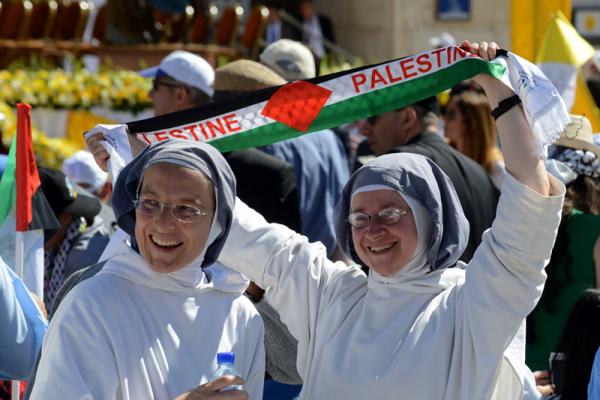Sister Helen Prejean, the Catholic nun and anti-death penalty activist whose story came to fame with the 1995 film Dead Man Walking, took the stand on May 11 in the penalty phase of convicted Boston Marathon bomber Dzhokhar Tsarnaev’s trial. She said he is “genuinely sorry for what he did,” and told her how he felt about the suffering he caused to the bombing’s victims.
“He said it emphatically,” Prejean said.
“He said no one deserves to suffer like they did.”
Pope Francis will bestow sainthood on two Palestinian nuns on May 17, a move that’s being seen as giving hope to the conflict-wracked Middle East and shining the spotlight on the plight of Christians in the region.
Sisters Maria Baouardy and Mary Alphonsine Danil Ghattas are due to be canonized by the pontiff along with two other 19th-century nuns, Sister Jeanne Emilie de Villeneuve, from France, and Italian Sister Maria Cristina dell’Immacolata.
The coming canonizations have been described by the Latin patriarch of Jerusalem, Fouad Twal, as a “sign of hope” for the region.
Earlier this year, I toured the U.S. government’s family immigration detention center in Dilley, Texas with a delegation of Roman Catholic and Lutheran faith leaders. It was a difficult and deeply moving day. Family immigration detention centers incarcerate immigrant mothers and children, many of whom fled Central America for their lives. More than 90 percent of these families suffered sexual, domestic, or physical violence, had their lives threatened by gangs, or experienced similar traumas. These are not threats or abuses to be taken lightly. When migrants who suffer these threats are deported, they are often targeted and killed upon return to their home country.
Nevertheless, the United States welcomes these families seeking safety with incarceration. They are frequently jailed for months, with little knowledge of their term length or if they will be deported. In detention, as basic possessions as their shoelaces are taken away. Children often lose weight. Mothers and children are isolated for punishment; infants are baptized in an ad-hoc fashion. Currently, more than 1,000 mothers and children are detained in detention centers. The government is planning to expand this number to 3,700.
There are more than 220 million women in developing countries who don’t want to get pregnant, but who lack access to family planning information and contraceptives. Every year, nearly 300,000 of them will die during pregnancy or from complications giving birth. Far too many mothers will bury their babies before they even get to know the sound of their laughter. More than 2.6 million babies will be stillborn, and another 2.9 million will die before they are a month old.
Giving women the opportunity to time their pregnancies and space out their children through effective, low-cost contraception is key to turning around these heartbreaking numbers.
If religious conservatives are truly awakening to the need to dialogue with global Christians, they need to be consistent. It doesn’t make sense to exploit non-Western perspectives on LGBT rights but refuse to hear those same voices on matters such as nationbuilding, war, immigration, environmental policy, and foreign aid.
The inconsistency leads me to believe that these calls are more about political posturing than a desire to really listen to our global brothers and sisters.
Reagan and John Paul helped spell doom for the Soviet empire, and the pontiff waged a decades-long campaign inside the church — helped by his doctrinal chief, Cardinal Joseph Ratzinger, who would later become Pope Benedict XVI — to quash liberation theology and silence its most ardent supporters.
Today, however, it’s a wholly different story — and to listen to the Rev. Gustavo Gutierrez, the Dominican priest from Peru who is known as the father of liberation theology, one might wonder what all the fuss was about.
Jesus not only knew how to pray; he knew what it was like to be arrested. When he had finished his table prayer, Jesus and his disciples went out across the Kidron valley to a garden. Judas knew about that garden because he and the other disciples often met there with Jesus. This time, Judas didn’t come to pray, but brought a detachment of soldiers and religious police. They arrested Jesus, bound him and took him away to be tried.
Jesus escaped prison only because he was executed by the state the next day. This crucified, risen, and wounded Jesus has returned to the heart of God. He continues to pray for us. Why wouldn’t Jesus be praying also for those who are in prison? Why wouldn’t we?
The story of world Christianity’s recent pilgrimage is dramatic and historically unprecedented. The “center of gravity” of Christianity’s presence in the world rested comfortably in Europe for centuries. In 1500, 95 percent of all Christians were in that region, and four centuries later, in 1910, 80 percent of all Christians were in Europe or North America.
But then, world Christianity began the most dramatic geographical shift in its history, moving rapidly toward the global South, and then also toward the East. By 1980, for the first time in 1,000 years, more Christians were found in the global South than the North. Growth in Africa was and remains incredible, with one of our four Christians now an African, and moving toward 40 percent of world Christianity by 2025. Asia’s Christian population, now at 350 million, will grow to 460 million by that same time. Even today, it’s estimated that more Christians worship on any given Sunday in churches in China than in the U.S.
This isn’t just about Tom Brady. As much as I may hate the guy, he and I have some things in common. Rhoden is pointing to a crisis that all humans face. No matter how successful we appear, we all face the same existential lack of being. I can have all the success and money in the world, but I will still feel an emptiness in my soul.
Why do we experience this lack of being? Because we are constantly comparing ourselves with others. This comparison leads us to believe that we aren’t enough, that we lack something within ourselves, and so we try to obtain something that will fill the void within our soul.
Religious identity used to be “inherited.” “Cradle Catholic” is shorthand for born into the faith; within Judaism, the faith is passed through a Jewish mother to her children unless they grow up to proclaim a different religion.
But children don’t just inherit parents’ spirituality, says psychologist Lisa Miller in her new book, The Spiritual Child. She writes that the essential sense of a transcendent power in the world — one that will love, guide, and accept them and wrap them in a protective layer of self-worth -– has to be nurtured.









